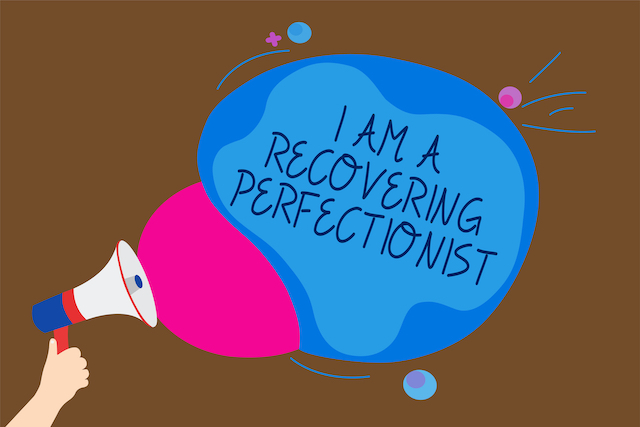Many people think that perfectionism is an admirable trait to have. They believe that it helps them perform better, and get more done. In reality, perfectionism can be a huge obstacle in your life. If you have trouble with everything being perfect all the time, this article can help. It will tell you more about it and how to deal with it.
Contents
- 1 Detailed Meaning Of Perfectionism
- 1.1 Causes Of Perfectionism
- 1.2 Signs That You Might Be A Perfectionist
- 1.3 Types of Perfectionism
- 1.4 Examples f Perfectionism
- 1.5 Domains Of Perfectionism
- 1.6 Myths About Perfectionism
- 1.7 How To Deal With Perfectionism
- 1.8 Treatment Options
- 1.9 Preventive Measures For Perfectionism
- 1.10 Helping Someone Who Is Suffering From Perfectionism
- 2 Conclusion
Detailed Meaning Of Perfectionism

Perfectionism is a term that describes a person’s need for everything to be perfect. This can include the need for perfection in themselves, their work, and their relationships. For people who are perfectionists, anything less than perfect is unacceptable.
Perfectionism can have both positive and negative aspects. On one hand, it can lead to high levels of achievement and motivation. On the other hand, it can also cause problems such as anxiety, stress, and depression.
Causes Of Perfectionism
There are many different factors that can contribute to perfectionism. Some of the most common ones include:
- A fear of failure or making mistakes
- Low self-esteem
- Negative perfectionist beliefs
- Pressure from others to be perfect
- Traumatic experiences
Signs That You Might Be A Perfectionist
If you are wondering whether or not you might be a perfectionist, here are some signs to look out for:
- You have high standards and expectations for yourself.
- You are very critical of yourself.
- One may find it difficult to delegate tasks or accept help.
- You always need to be in control.
- You become stressed and anxious when things are not perfect.
- One may feel guilty or ashamed if one makes a mistake.
- You have difficulty enjoying things that are not perfect.
If you recognize any of these signs in yourself, it is important to seek help. perfectionism can be very damaging and it is important to get support if you need it.
Types of Perfectionism
There are a number of distinct forms of perfectionism. While their actions are comparable, the motives and results of these types are frequently different.
- Personal standards perfectionism: People who are personal standards perfectionists set high goals for themselves. They believe that their goals need to be met in order to feel satisfied with their performance.
- Social comparison perfectionism: A person who is a social comparison perfectionist will compare themselves with others, and measure themselves against them. This type of perfectionist believes that they have the right to judge other people’s mistakes or achievements based on how well they do compare to those around them.
- Self-oriented practical perfectionism: Those who are self-oriented practicals frequently try hard at everything they do because they want things done properly. They often dislike being rushed when doing something, feeling a sense of urgency about getting things over and done with so as not to get distracted from it.
- Other-oriented practical perfectionism: This is the opposite of self-oriented practical perfectionism and is where people put great pressure on others to do things perfectly. They frequently have unrealistically high standards for other people and can be very critical if they do not meet these expectations.
- Organizational or system perfectionism: People with this type of perfectionism like orderliness, symmetry, and predictability in their lives. Everything has to be just so or they will become extremely distressed.
- Mathematical/technical perfectionism: These individuals are often very detail-oriented when it comes to tasks that require mathematical skills or technical proficiency. Anything less than perfect performance in these areas can lead to feelings of anxiety, frustration, and inadequacy.
Examples f Perfectionism

Many different people can be perfectionists. Some examples include:
- Athletes who need to achieve a certain level of performance before competing
- People in the workplace who constantly feel under pressure to produce good results or meet targets
- People in relationships, who are constantly critical and demanding of their partners
- Parents who want their children to excel in everything they do
Domains Of Perfectionism
Perfectionism can be applied across several different domains in someone’s life. These include:
- Self (e.g., self-esteem and personal standards)
- Others (e.g., criticism and social comparison)
- Organization/work (e.g., organization, efficiency, and productivity)
- Mood (e.g., depression and anxiety)
- Physical (e.g., eating behaviors and physical health).
- Intimate Relationships or friendships (e.g., criticalness, demandingness, and perfectionism about friends)
- Environment or surroundings (e.g., symmetry, cleanliness)
Myths About Perfectionism

Myth: Perfectionism is a good thing.
Reality: Perfectionism can be very harmful and can lead to depression, anxiety, and other mental health problems.
Myth: You have to be perfect to be happy.
Reality: Nobody is perfect and trying to be will only make you unhappy.
Myth: Perfectionism is the same as high standards.
Reality: High standards are about doing your best, whereas perfectionism is about being perfect which is impossible.
Myth: If you’re a perfectionist, you must be very successful.
Reality: Being a perfectionist doesn’t mean that you’re successful – it means that you’re never satisfied with your work which can lead to a lot of stress and frustration.
Myth: Perfectionism is only a problem for people who are very organized and detail-oriented.
Reality: There is no one type of perfectionist – it can affect anyone, regardless of their personality or lifestyle.
One of the first steps to overcoming perfectionism is recognizing that it’s a problem. Once you know what the symptoms are and how it functions, then you can start working on solutions (like getting help from people who have dealt with similar problems). One of those solutions might be setting achievable goals for yourself, like trying something new without fearing failure or rejection. That way you don’t feel as overwhelmed by the endless possibilities in front of you and instead focus on making measurable progress towards your goal.
How To Deal With Perfectionism

If you are struggling with perfectionism, there are several things that you can do to help manage it. These include:
- Challenging your beliefs: Many perfectionists have rigid beliefs about themselves and the world around them. If you have perfectionistic beliefs, it is important to challenge these and try to replace them with more realistic ones.
- Getting support: Seeking help from a professional can be very beneficial in helping you manage your perfectionism. Having someone that understands what you are going through will make all the difference in trying to deal with this problem or condition.
- Increasing your awareness: Understanding what perfectionism is and why you feel the way that you do about it will help you to manage this condition. Being aware of everything around yourself, including how others perceive things can be very beneficial in helping you understand more about your thoughts and feelings.
Other tips to deal with the issue are:
- Start by acknowledging that perfectionism is not healthy and that it is ok to make mistakes.
- Challenge your thoughts and beliefs about perfectionism. For example, ask yourself whether everything needs to be perfect or if there is room for error.
- Make a list of your achievements, even if they are not perfect. This will help you realize that you are capable of doing things, even if they are not perfect.
- Take time out for yourself and relax. This will help reduce the amount of stress and anxiety caused by perfectionism.
- Talk to someone about your problems with perfectionism. This can be a friend, family member, or therapist.
- Challenge yourself to do something new and different. This can help you break out of your perfectionist mindset.
Treatment Options

If perfectionism is causing you distress and interfering with your daily life, several treatment options are available. These include:
- Cognitive-behavioral therapy (CBT): CBT is a type of therapy that helps you to change the way that you think and behave. It can be beneficial in helping you manage perfectionism.
- Interpersonal therapy: This type of therapy focuses on your relationships with other people. It can help identify how perfectionism is impacting your interactions with others.
- Group therapy: Group therapy involves meeting with a group of people who have similar problems. This can be beneficial in helping you to share your experiences and get support from others who understand what you are going through.
- Medication: Although no medications are specifically prescribed for perfectionism, some can help treat symptoms such as depression and anxiety that may arise from this condition.
Preventive Measures For Perfectionism
If you have a family history of perfectionism, there are several things that you can do to help manage this condition. These include:
- Learning how to cope with stress and distress in healthy ways such as exercising or practicing mindfulness meditation.
- Spending time with people who understand what you are going through and who will not judge your thoughts and feelings.
- Challenging your thoughts and beliefs about perfectionism by questioning them and asking yourself whether they are true or not.
- Seeking help from a professional such as a therapist to talk about what you are going through in coping with this condition and how you can manage it better in the future.
- Spending time doing things that you enjoy and make you happy. This can help reduce the amount of stress that is caused by perfectionism.
Perfectionism is a condition that causes individuals to strive for excellence and be very critical of themselves and the world around them. If you have perfectionistic beliefs, it is important to challenge these and try to replace them with more realistic ones.
Helping Someone Who Is Suffering From Perfectionism
If you are helping someone who is suffering from perfectionism, it is important to be nonjudgmental and encourage them to explore their thoughts and feelings. Try to understand how your loved one feels. They might not like anything that is less than perfect.
It can be hard when someone does not behave like you or has beliefs that are different than yours. It is okay to think they are wrong, but try to be nice about it. Instead of criticizing them, try your best to set a good example by behaving the way you want them to behave.
If you are having a hard time with someone’s perfectionism, talk to somebody. They might be able to help you deal with this problem.
Perfectionism can cause a great deal of stress and distress. Sometimes, people have a problem with being too perfectionist. You can learn how to manage this better with time and patience. One way is by talking about your problems when you are sad or mad. Another way is when you are perfect about something, you can challenge yourself by thinking of the bad things that will happen if it doesn’t turn out well.
Conclusion
The first step to overcoming perfectionism is recognizing that it’s a problem. Once you know what the symptoms are and how it functions, then you can start working on solutions (like getting help from people who have dealt with similar problems). One of those solutions might be setting achievable goals for yourself, like trying something new without fearing failure or rejection. That way you don’t feel as overwhelmed by the endless possibilities in front of you and instead focus on making measurable progress towards your goal.
Another solution is learning how to cope with stress. This might include exercise, breathing exercises, or just talking about your problems with somebody you trust. Perfectionism often leads people to feel isolated and ashamed of their thoughts and feelings, so it can be helpful to have a support group of people who understand what you are going through.
If you are looking for affordable Online Counseling MantraCare can help: Book a trial therapy session


